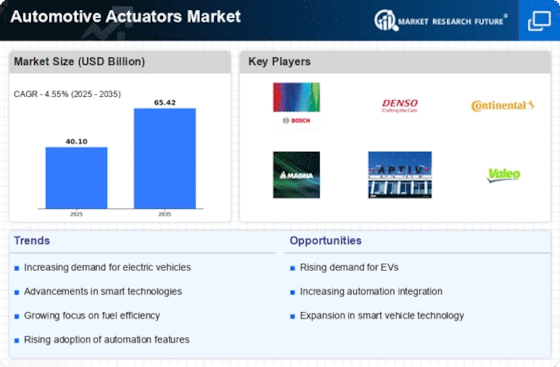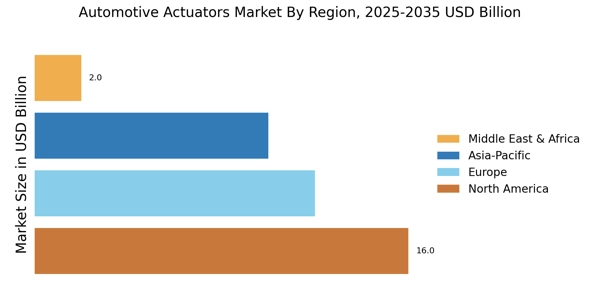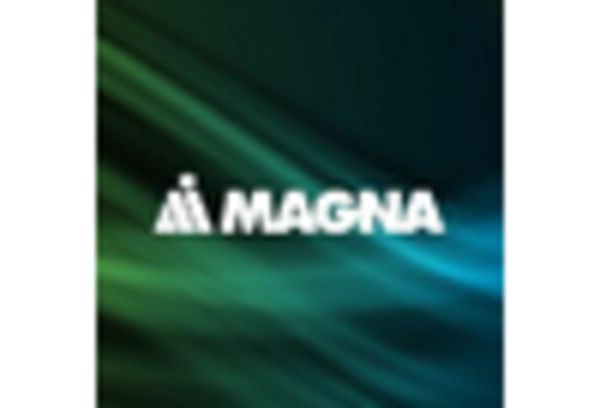Rising Demand for Fuel Efficiency
The Automotive Actuators Market is experiencing a notable surge in demand for fuel-efficient vehicles. As consumers become increasingly conscious of fuel costs and environmental impacts, automakers are compelled to innovate. Actuators play a crucial role in optimizing engine performance and enhancing fuel efficiency. According to recent data, vehicles equipped with advanced actuators can achieve up to 15% better fuel economy compared to traditional systems. This trend is likely to drive the adoption of sophisticated actuator technologies, as manufacturers seek to meet regulatory standards and consumer expectations. Consequently, the Automotive Actuators Market is poised for growth, as the integration of these components becomes essential for modern vehicle design.
Growth of the Electric Vehicle Market
The Automotive Actuators Market is witnessing growth driven by the expansion of the electric vehicle market. As electric vehicles (EVs) gain traction, the demand for specialized actuators tailored for electric drivetrains is increasing. These actuators are essential for managing battery systems, thermal management, and power distribution. Current projections suggest that the EV market could account for 30% of total vehicle sales by 2030, which will likely create substantial opportunities for actuator manufacturers. This shift towards electrification indicates that the Automotive Actuators Market must adapt to meet the unique requirements of electric vehicles, fostering innovation and development.
Increasing Focus on Vehicle Safety Regulations
The Automotive Actuators Market is also shaped by the increasing focus on vehicle safety regulations. Governments worldwide are implementing stringent safety standards, compelling manufacturers to enhance vehicle safety features. Actuators are pivotal in systems such as electronic stability control, anti-lock braking systems, and advanced driver-assistance systems. As a result, the demand for high-quality actuators is expected to rise. Recent statistics indicate that The Automotive Actuators Market is anticipated to grow at a CAGR of 8.5% through 2027, which will likely benefit the Automotive Actuators Market. This regulatory environment encourages innovation and investment in actuator technologies that enhance vehicle safety.
Advancements in Autonomous Driving Technologies
The Automotive Actuators Market is significantly influenced by the rapid advancements in autonomous driving technologies. As the automotive sector shifts towards automation, the demand for precise and reliable actuators is escalating. These components are integral to the functioning of various automated systems, including steering, braking, and throttle control. Market analysis indicates that the global market for autonomous vehicles is projected to reach USD 557 billion by 2026, which will likely propel the need for advanced actuators. This trend suggests that the Automotive Actuators Market will expand as manufacturers invest in developing actuators that can support the complexities of autonomous driving.
Integration of Advanced Manufacturing Technologies
The Automotive Actuators Market is being transformed by the integration of advanced manufacturing technologies. Innovations such as 3D printing, automation, and smart manufacturing are enhancing production efficiency and reducing costs. These technologies enable manufacturers to produce complex actuator designs that were previously unfeasible. As a result, the market is likely to see an influx of new actuator solutions that offer improved performance and reliability. Data suggests that the adoption of Industry 4.0 practices could increase productivity in the automotive sector by up to 30% by 2030. This trend indicates that the Automotive Actuators Market will benefit from these advancements, leading to a more competitive landscape.

















